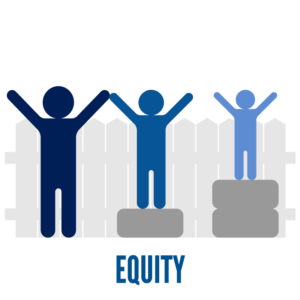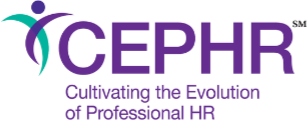DEI in the Workplace: Understanding Equity

In the pursuit of creating fair and inclusive environments, understanding the meaning behind equity is important. It represents distinct concepts with deep implications for addressing disparities and fostering genuine inclusion. We had the privilege of speaking with Tiffany Castagno, the CEO of CEPHR, LLC. In this article you will hear from Tiffany, whose expertise and experiences offer invaluable insights into navigating the complexities of equity in a diverse setting.
What is Equity and Why is it Important:
So, what is Equity? Equity recognizes that each person has different circumstances and allocates the exact resources and opportunities needed to reach an equal outcome. This always reminds me of the multiple conversations I’ve had (and the work I’ve done) around the disparities and pitfalls (as well as people’s perceptions) of giving equal weight to the terms “fair and equal”. Fair isn’t always equal and the same is true for equity. When we consider full diversity, fair shouldn’t be equal, and equity shouldn’t equal equality because we are all different humans with different needs, different lived experiences, and different perspectives.

Diversity, Equity, Inclusion, and Belonging (DEIB):
Our businesses need different things too. Giving clients the exact same experience and supporting them all in the exact same way isn’t equity and doesn’t best support them. My “why” of supporting small to medium businesses and underrepresented businesses and people is fueled by my drive for Diversity, Equity, Inclusion, and Belonging (DEIB). It’s about designing not just policies and programs, but about building systems for all, and not just performatively because of or in spite of certain circumstances, backgrounds, or lived experiences. I belong to an underrepresented and historically marginalized group that faces (and has faced) biases, microaggressions, racism, colorism, and lack of equal pay in access to advancement opportunities, financial and other opportunities (even as an Independent Consultant). My needs are not the same as other women, other black folks, or even other business owners.
Health Care Disparities:
When we look across our health care landscape, folks of different genders, sexes, and gender identities also have different needs. I happen to be a 47-year-old Black woman going through perimenopause. My health care needs, questions, frame of reference in my lived experience, patient experience, and other factors are going to be completely different from a gay or trans friend or colleague’s experiences. We see such wild and varying disparities in our health care system and it’s a system that requires further support and scrutiny for sure. Finding Black providers is not always easy. Women (specifically Black women) often deal with providers who don’t believe them or are dismissive of their pain, their concerns, and what they need.
Avoiding Harmful Assumptions:
Other things that are harmful are making broad assumptions or stereotyping people. Even initiatives or situations with the best intent can have harmful impacts. For instance, if we assume that all who have certain abilities or who appear to have certain abilities need the same thing, we could be missing opportunities to connect with and support those who identify as having a disability because they may not disclose that to us and we’ve now unintentionally excluded them and what they need to thrive.
Supporting Diversity and Inclusion:
These are only some of the types of societal, historical, and systemic issues that uphold systems of oppression. One great way to support breaking down these barriers and to acknowledge and tackle these changes is to start with listening to others who are different than you. Appreciate the nuances that make them unique. It’s important to believe folks’ stories and experiences versus dismissing them or making dismissive comments that make them feel unseen and unheard. Mentorship and sponsorship are helpful tools and programs to support making sure that underrepresented folks and historically marginalized groups have a voice in the room whether or not they are there. How can you show up for someone today?
Infusing DEIB into Work:
In my work as a Human Resources and Culture Consultant, I focus on infusing DEIB into the picture because our whole being comes into work with us- not just parts- not even the sum of our parts. It takes a whole being to face the demands of the workplace, even in the best and most psychologically safe of workplaces because we all still have things outside of work. To begin the deep work needed in our systems, we need to be able to face these realities and strategically plan in order to take holistic approaches in order for our workplaces, communities, and other spaces to allow the people within them to not only survive but thrive. If you’re ready to commit to a culture change that is representative of full DEIB, book a Culture Call and let’s explore what that means for your organization!

Conclusion:
Tiffany’s expertise in equity underscores the vital role specialized platforms like Equality Careers play in the modern job market. By emphasizing equitable opportunities, we embody this principle by ensuring that job seekers from diverse backgrounds, especially those within the LGBTQIA+ talent community, find roles where their unique needs and experiences are valued and supported. This alignment with Tiffany’s insights from CEPHR, LLC highlights the importance of platforms that strive for equity in action, ensuring that every individual has the support and opportunities they need to thrive.
